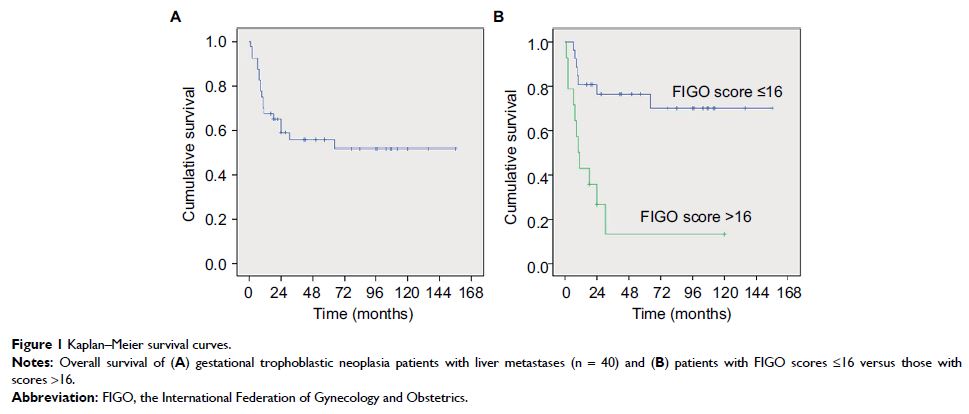108985
论文已发表
注册即可获取德孚的最新动态
IF 收录期刊
- 3.4 Breast Cancer (Dove Med Press)
- 3.2 Clin Epidemiol
- 2.6 Cancer Manag Res
- 2.9 Infect Drug Resist
- 3.7 Clin Interv Aging
- 5.1 Drug Des Dev Ther
- 3.1 Int J Chronic Obstr
- 6.6 Int J Nanomed
- 2.6 Int J Women's Health
- 2.9 Neuropsych Dis Treat
- 2.8 OncoTargets Ther
- 2.0 Patient Prefer Adher
- 2.2 Ther Clin Risk Manag
- 2.5 J Pain Res
- 3.0 Diabet Metab Synd Ob
- 3.2 Psychol Res Behav Ma
- 3.4 Nat Sci Sleep
- 1.8 Pharmgenomics Pers Med
- 2.0 Risk Manag Healthc Policy
- 4.1 J Inflamm Res
- 2.0 Int J Gen Med
- 3.4 J Hepatocell Carcinoma
- 3.0 J Asthma Allergy
- 2.2 Clin Cosmet Investig Dermatol
- 2.4 J Multidiscip Healthc

妊娠滋养细胞肿瘤肝转移患者的治疗和预后:回顾性队列研究
Authors Zong LJ, Yang JJ, Wang XY, Kong YJ, Ren T, Zhao J, Feng FZ, Wan XR, Xiang Y
Received 22 December 2017
Accepted for publication 2 February 2018
Published 23 March 2018 Volume 2018:10 Pages 557—563
DOI https://doi.org/10.2147/CMAR.S160606
Checked for plagiarism Yes
Review by Single-blind
Peer reviewers approved by Dr Andrew Yee
Peer reviewer comments 4
Editor who approved publication: Professor Nakshatri
Purpose: The
aims of this study were to analyze the clinical features, identify prognostic
factors, and evaluate the survival outcomes of gestational trophoblastic
neoplasia (GTN) patients with liver metastases.
Patients and
methods: Forty patients with liver metastases
arising from GTNs, who were treated at the Peking Union Medical College
Hospital (Beijing, People’s Republic of China) between January 1999 and
December 2015, were recruited from the institutional database, and their
medical records were reviewed. Univariate and multivariate analyses were
performed to identify independent risk factors for survival.
Results: Twenty-seven patients (67.5%) achieved complete remission after
multidrug chemotherapy treatment. The remaining 13 patients (32.5%) had disease
progression. Eighteen patients (45.0%) died during treatment or follow-up. A
history of failed multidrug chemotherapy was an independent risk factor for
survival (OR: 5.57, 95% CI: 1.42–21.86, P =0.014). Moreover,
patients with an International Federation of Gynecology and Obstetrics (FIGO)
score of >16 had a significantly poorer survival than those with a score of
≤16 (P <0.001).
Conclusion: GTN with liver metastasis is a very rare disease with a relatively
poor prognosis. Patients with a history of failed multidrug chemotherapy and a
FIGO score of >16 have poorer survival outcomes. Multidrug chemotherapy is
the key to the management of GTN patients with liver metastases.
Keywords: multidrug chemotherapy failure, FIGO score, multidrug
chemotherapy, hepatic metastasis
